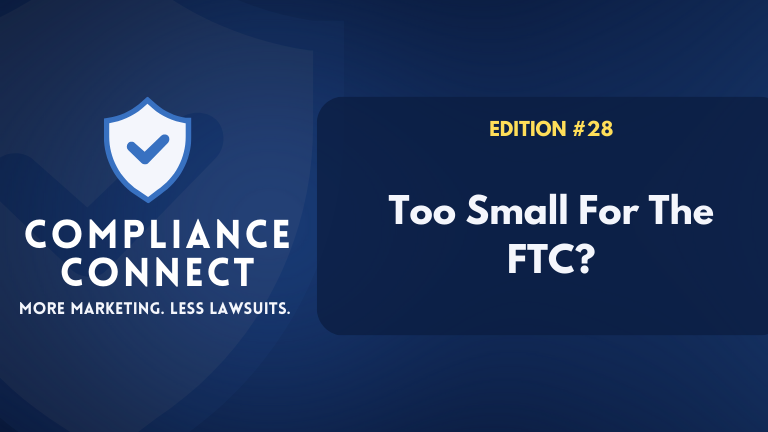Good morning! This is the twenty-eighth edition of the Compliance Connect newsletter.
The goal is simple: to keep you in the loop on what the FTC and other regulatory agencies are up to so that you can protect yourself.
These newsletters will land in your inbox twice a week – Mondays and Thursdays.
Remember: this is NOT legal advice, only information!
Here’s the rundown today…
- 📞 FTC Acts To Protect Seniors With New Telemarketing Rule
- 🍔 Beyond Meat Settles Over Deceptive Advertising
- 🔍 Does The FTC Ignore Small Companies?
- ✍️ Can Copywriters Be Held Liable?
- ⭐ Important Endorsement Requirement
Compliance Digest: What You Should Read Today
FTC Expands Telemarketing Sales Rule To Protect Seniors
The FTC has expanded its Telemarketing Sales Rule (TSR) to include inbound telemarketing calls for technical support services, aiming to combat scams targeting older consumers.
This amendment addresses calls made by consumers responding to ads or mail solicitations offering tech support.
Last year, consumers over 60 reported losing over $175 million to tech support scams.
The new rule defines “technical support services” broadly and removes exemptions for calls responding to advertisements or direct mail.
Most provisions will take effect 60 days after publication.
Vegan Meat Company Settles Over Deceptive Protein Claims
Beyond Meat, a California-based vegan meat company, has agreed to pay $7.5 million to settle class action lawsuits alleging it overstated the protein content and quality of its products.
The company, known for plant-based burgers and sausages, DENIES the claims but settled to avoid further litigation costs.
This story is a reminder that regulators are not the only ones who can sue you for deceptive advertising – class action lawsuits are also a real threat.
Consumers who purchased Beyond Meat products between May 31, 2018, and August 14, 2024, can file a claim for compensation until April 14, 2025.

Are You Too Small For The FTC?
One of the most common things we hear from skeptical marketers and business owners is…
“I’m too small to get sued by the FTC.”
That mentality is DANGEROUS.
The FTC and other regulatory bodies have repeatedly made one thing crystal clear: no one is too small to be investigated or sued.
There is no “minimum threshold” required to be targeted. The law is the law, and it applies to everyone.
The Amazons and Facebooks of the world may get the big headlines, but every single month, small companies around the world end up being investigated.
Here are some examples…
- A1 Docprep had only 136 eligible customers and was fined $232,755.
- CD Capital Investments had only 243 eligible customers and was fined $132,072.
- Manhattan Beach Venture had only 2,889 eligible customers and was fined $292,200.
- Campbell Capital had only 603 eligible customers and was fined $30,000.
- Vision Solution Marketing had only 1,177 customers and was fined $1.67 million.
Greg talks about clients he represented who settled for $15,000 and another one who settled by giving the FTC just his watch.
The bottom line is that you are never too small to get investigated.
Most of the stores we cover in this newsletter are about the big companies.
However, there are many more examples of small companies bankrupted by an FTC investigation… or a class action lawsuit from unhappy customers… or an aggressive state AG.
Never let the fact that “you’re a small company” prevent you from becoming compliant.
If you are a small company, prioritize compliance NOW so that you grow from a solid, compliant foundation.
Did You Know…
The Consumer Financial Protection Bureau was formed in 2011 and focuses on protecting customers of financial products.

Ask Greg Mailbag #5
FTC attorney Greg Christiansen from Guardian Law periodically answers questions from members of our community.
Herek: Let’s say I’m providing copywriting services for a client but the client prefers to use headlines with income claims which aren’t typical results. The client refuses to heed my advice about using compliant headlines. If the FTC decides to sue my client for non-compliance, will I also get into trouble? Will I still be implicated if I stop working with the client before they get sued?
You will naturally be on the target.
When the FTC brings a lawsuit, they ask for discovery. Discovery will include a list of all of the companies assisting with the marketing. Which in this case will be you.
Then you will receive a demand from the FTC for all of your files, they will see what you are doing, and then they will sue you.
Sooze: If you offer to do free websites for the first 3 people who respond and return a project specification form. And you provide the website. At the end you request a review or a pic of them in front of their website on the screen with a thumbs up sign. And you get their written release giving permission to use their review across multiple channels including digital and physical. Do you have to put a disclaimer below the review stating that it is Paid Advertisement? Thank you mucho in advance!
If you look at the recent FTC rules regarding endorsements, if you receive a testimonial based on some sort of compensation, then you must disclose the terms of the consideration.
If you fail to do so, you are misleading the public and potential clients.
